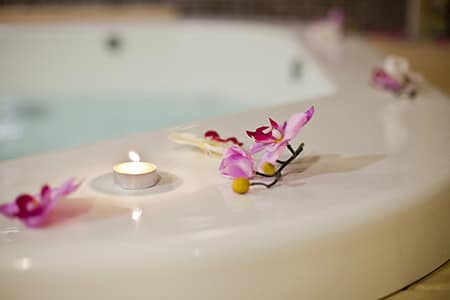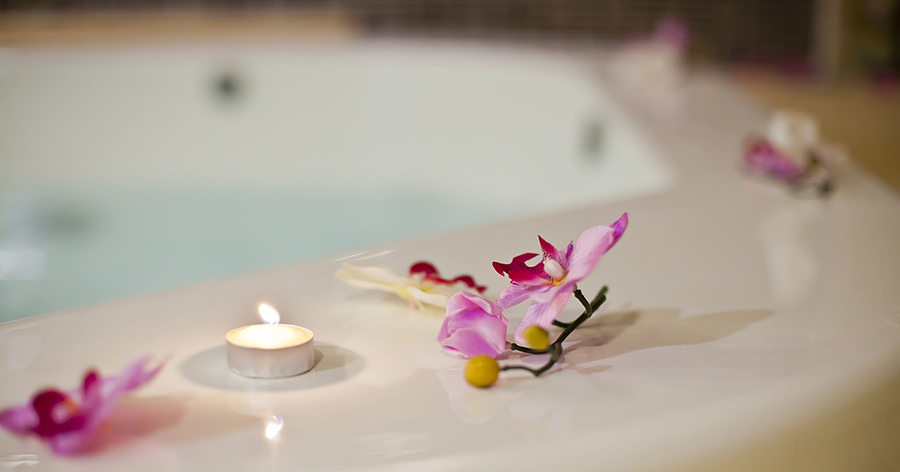
Did you know that the average human can detect one trillion distinct scents, or that our scent cells that detect smells are renewed every 30 to 60 days? Our sense of smell is also apparently one of our oldest most primeval senses so it may come as no real surprise that for centuries we have used aromatherapy for it’s medicinal and healing properties. In more recent years hot tub aromatherapy has increased in popularity and in this guide we are going to look at ways that you can use aromatherapy in your hot tub.
Not only can aromatherapy help you ease away common complaints such as sleeplessness, stress, headaches and muscle aches and pains it also makes your hot tub smell nice and be a relaxing place to be. Many essential oils have antibacterial and cleansing properties too so they can help keep both you and your hot tub fresher and cleaner too.
What is aromatherapy?
So, before looking at how to use aromatherapy in your hot tub let’s have a think about what aromatherapy actually is and what it’s potential benefits might be for use in your hot tub.
Aromatherapy, or the use of essential oils for treating physical and psychological conditions, has been used for thousands of years. The first distillation of essential oils has been attributed to the ancient Persians in the 10th century although it may well have been around for many generations before this. The distillation of essential oils is an ancient art which basically extracts the oils from aromatic plants by a method of heating and condensing. There are around 700 plants that can be used to create essential oils and the first recorded method for distillation was made in 16th Century Germany. Aromatherapy was popular in France throughout the 19th Century also but gradually gave way to more modern chemical medicines as the 20th century progressed.
Today, natural botanical medicines are still recognized in France and Germany but the mainstream medical world more strongly favors chemical treatments. However, there is an increasing recognition that the natural world has it’s part to play and more progressive medical thinking sees the role of modern medicines and botanical medicines working in harmony.
The actual term “aromatherapy” was first coined by a French perfumier called Rene-Maurice Gattfosse in a book he wrote 1937. He has become known as the grandfather of Aromatherapy and is particularly well known for his research into the healing properties of lavender.
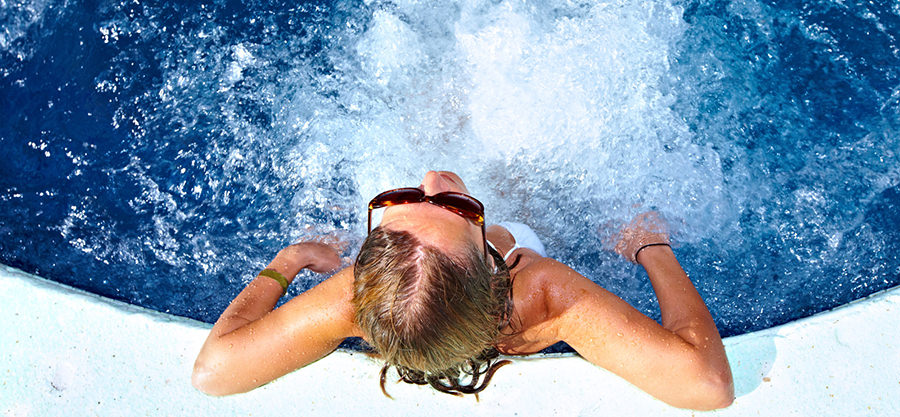
How Does aromatherapy work?
Aromatherapy works through smell, inhalation and absorption.
Aromatherapy and smell – Our sense of smell is the oldest of our senses and is deeply linked to ancient parts of the brain. Certain smells can trigger deep instincts and can be linked to strong emotional and even physical responses. Just think how a certain smell can instantly transport you back in time or remind you of a person or place. It’s this amazingly strong instinctive response to smell that can make our response to essential oils so powerful.
Once the aromatic molecules are inhaled they travel up to the top of the nose and come into contact with the Olfactory cells. These each have tiny hairs that each recognize a particular smell. This information is then passed onto the limbic system which is the part of the brain most closely associated with survival, instinct and emotions. It’s thought that the recognition of the aromatic information then makes slight adjustments to the brain chemistry, therefore influencing how we feel and our mood.
Aromatherapy and inhalation – Aromatherapy oils are also breathed into the respiratory system. If you imagine sitting in your hot tub you will essentially be breathing in the vapors from the hot tub so if you do add essential oils to the hot tub your respiratory system will also get the benefit. Some essential oils have been associated with having antibacterial and antiviral properties and so in effect cleans the lungs as you inhale them.
Aromatherapy and absorption – Finally, aromatherapy oils can be absorbed through the skin. Often this is via massage but, if you are using aromatherapy oils in your hot tub, then the oil will enter your skin anyway. The molecules are small enough to pass through the outer layer of skin and also to penetrate the inner layer of skin – the dermis. Once in the dermis, the oils pass into the blood vessels and are then transported all around the body via the bloodstream. This is a good thing as most aromatherapy oils have antibacterial properties and are antioxidants. Some also have anti-viral properties and also act as anti-inflammatories which means that they are great for all-round health but also good for helping ease aching muscles or joints. The oils don’t remain in the system for long and are excreted via the kidneys but their positive effects can last for quite a long time after they have left the body.
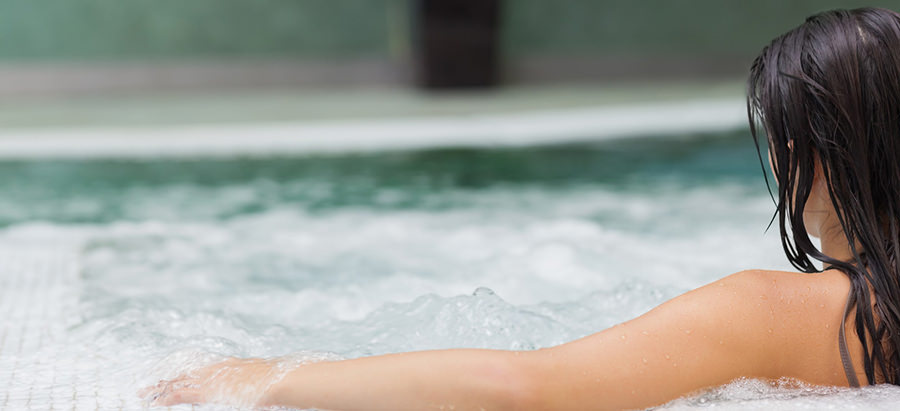
What are the best essential oils?
There are around 700 plants used in the making of essential oils for aromatherapy and so there are a huge number of essential oil varieties available. However, you are probably most likely to come across a few regular favorites which you will find below. Essential oils can be used to treat anxiety, inflammation, respiratory problems, sleep problems, aching muscles and a whole host of other complaints.
Lavender: Lavender is probably one of the first aromatherapy oils that you would think of it’s certainly one of the most popular due to its fantastic smell and ease of availability. Lavender is known to help and aid restful and peaceful sleep. If you spend your nights tossing and turning and find it difficult to get off to sleep or to switch your brain then lavender might well be a good essential oil to try. Lavender is also known to lower blood pressure and also to lower the body temperature slightly as well so it offers an all-round calming and soothing experience.
Clary Sage: Sage is known for reducing stress and tension. It can possibly lower the blood pressure and also reduce your breathing rate so is great for reducing anxiety and also increasing your focus. Sage is also supposed to boost up memory capacity and attention span as well as help with circulation.
Peppermint: Unsurprisingly peppermint is known for waking you up and making you feel fresh and alert. It’s also known for helping boost your memory and it is energizing and fights fatigue as well. As an extra perk peppermint is also supposed to reduce chocolate cravings!
Rosemary: Rosemary is known for boosting your brain power and increasing your ability to process when you are involved in doing mental tasks. It leaves you feeling refreshed and mentally stimulated and is also known to boost energy and lower fatigue levels.
Cinnamon: Cinnamon can be used to boost concentration and focus and it has also so been connected with keeping as calm and less flustered under pressure. It was a highly valued commodity in past times and so was extremely expensive possibly because of its multitude of uses. Cinnamon is also said to be good for clearing up chest colds but it also has anti-inflammatory qualities, is an analgesic and a powerful natural preservative. Cinnamon is also said to have antioxidant properties as well.
Lemon: We are all very familiar with the fruity, citrus scent of lemon and it already has associations with freshness and energy. Using lemon in aromatherapy will lift and improve your mood and greatly decreased levels of stress and anxiety. Lemon is also extremely good for the skin in and can help reduce and soften wrinkles as well as repair and strengthen the skin as well.
Eucalyptus: Eucalyptus is great for reducing stuffiness and nasal congestion. It is also great for achieving mental clarity and is good for helping reduce the symptoms of headaches as well.
Bergamot: Bergamot reduces stress levels and has been shown to actually reduce cortisol hormone levels. Cortisol is the hormone associated with the fight or flight reflex and, in small doses is helpful and beneficial. However, if we have too much stress and therefore too much cortisol in our systems it can lead to being overweight, having hunger cravings and it affects our mood and wellbeing.
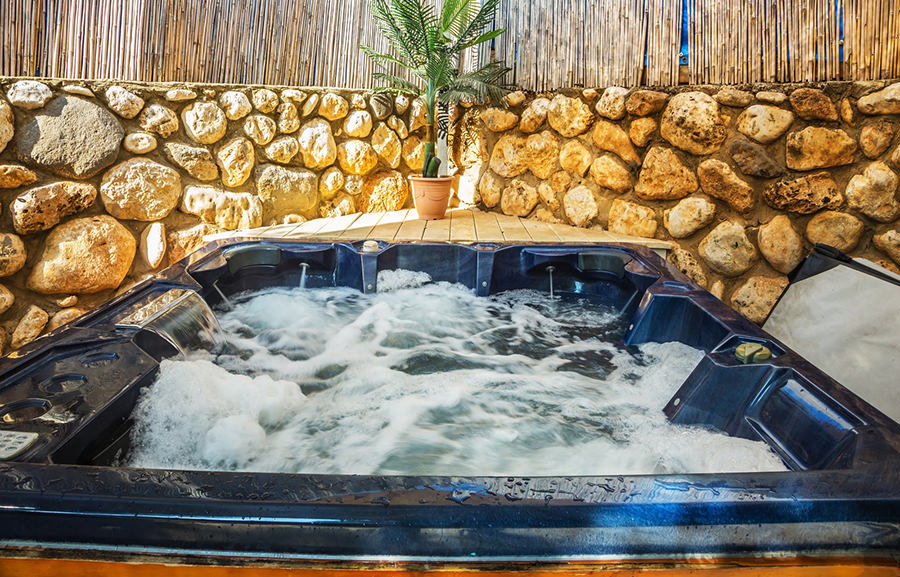
Can you use essential oils in a spa?
So, we have seen that using aromatherapy oil can have all sorts of beneficial properties ranging from improvements to skin, circulation and easing sore muscles through to reducing anxiety and helping with getting a good night’s sleep. Using essential oils in your hot tub seems like a great idea. After all you probably want to use your hot tub to help relax, ease aching muscles and help with a good night’s sleep as well, so the two things do seem to go hand in hand very well. Adding aromatherapy oils to your hot tub water also means that you can inhale at the same time as getting the oil absorbed through your skin and into your blood flow as we looked at above.
The other advantage to using essential oil in your hot tub is that it will help to mask the smell of unpleasant chemicals. Many people find the smell of chlorine unpleasant and having it masked by the aroma of essential oil is much more preferable. Of course, there are ways to sanitize your hot tub without using a lot of chlorine or even without regularly using chlorine at all but having a soothing and fresh-smelling hot tub is always a pleasant experience anyway!
However, there is a bit of a problem. Hot tub filtration systems are simply not designed to deal with oils of any kind and if you do put any essential oils into your hot tub it will more than likely cause problems with your filters. This will go on to lead to your water becoming dirty and cloudy quite quickly and obviously this is not a great idea. You might be surprised to find that even a couple of drops of essential oil into your hot tub will be problematic. Essential oils are highly concentrated and quickly disperse throughout the hot tub water and will potentially cause problems with the filtration system quite quickly.
It’s also possible that essential oil will leave a slight residue on the hot tub shell and inside the pipework as well. Whilst this isn’t a problem in itself it can be extremely hard to get rid of and can potentially collect dirt and bacteria as well as have some influence on your water chemistry.
How can I make my hot tub smell better?
The good news is that you can use aromatherapy in your hot tub but you need to use specially designed oils rather than general aromatherapy essential oils. Aromatherapy oil that is designed for hot tubs will be fine to use with your filtration system and you will also get the benefits of the aromatherapy as well. If you are in any doubt as to which type of oil to buy or which type of aromatherapy oil might be compatible with your filtration system in your hot tub then it would be a good idea to check with your hot tub manufacturer or to have a look in your handbook which should help. Once you have found the correct type of oil it’s simply a case of popping a few drops into your hot tub and enjoying the benefits.
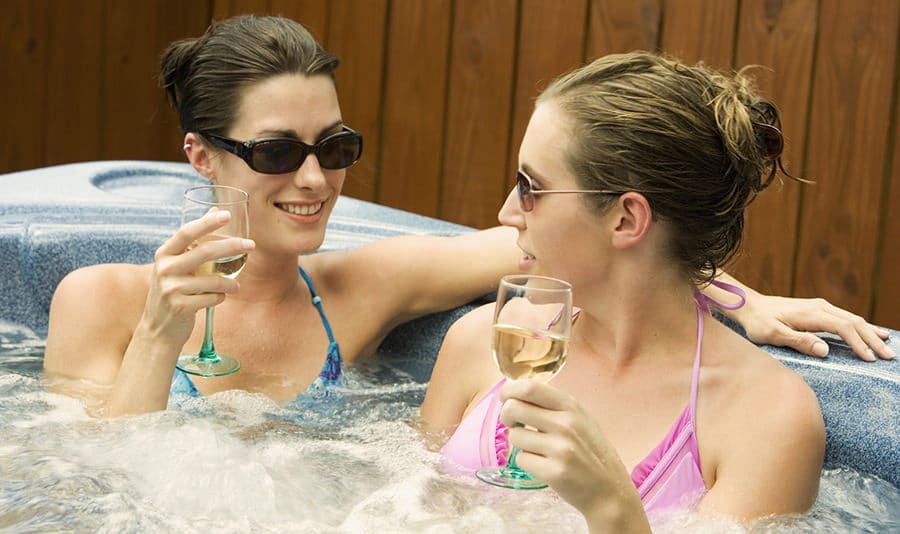
The disadvantage to this is that once the oil is in the hot tub then the hot tub will always smell until either the oil dissipates or you change the water. You might start to find the repeated exposure to the same smell a bit tiring after a while and wish that you could change it or simply that it would stop! If you think you might feel like this then it could be a good idea to first add the aromatherapy oil a week or so before you are going to drain the hot tub and do a water change so that you have the opportunity of not smelling the oil! If you choose not to do this the aroma will dissipate naturally after a while but it’s good to have the option when you are first giving this a go! However, to a certain extent, aromatherapy isn’t an exact science and you may want to experiment with mixing various oils and scents. Just don’t go too overboard or your sense of smell will get a bit overwhelmed! Why not try a different aromatherapy oil each time you use the hot tub?
Related Questions:
Can I use a bath bomb in a hot tub? Having a bath bomb in your hot tub does sound like great fun but the answer to the question really is in the name of the product. We are talking about bath bombs here which are designed to go in baths! Some contain glitter and other solid colored particles which will block jets and filters and cause all sorts of problems with a hot tub. Also, many have oils and butters in their ingredients which will again cause havoc with your water chemistry and PH levels. The best advice is not to use bath bombs in your hot tub unless they are specifically designed for hot tub usage.
Can you put tea tree oil in a hot tub? You can put tea tree oil in a hot tub but it is a good idea to purchase a particular tea tree oil that is specially intended for use in hot tubs. Some other types of oils will cause problems with the hot tub’s filtration system.
Can you use essential oils in a hot tub? In theory, at least you can put essential oils into a hot tub without any problems. The aroma will dissipate with the vapors from the hot tub and provide a good aromatherapy experience. However, the essential oils are usually mixed with a heavier carrier oil and this can cause problems with your hot tub’s filters and filtration system. The best thing is to buy aromatherapy oils that have been specially designed to be used in a hot tub. These will give all of the benefits of the essential oils but will avoid the problems of blocking filters and filtration systems due to their heavy stickiness.

